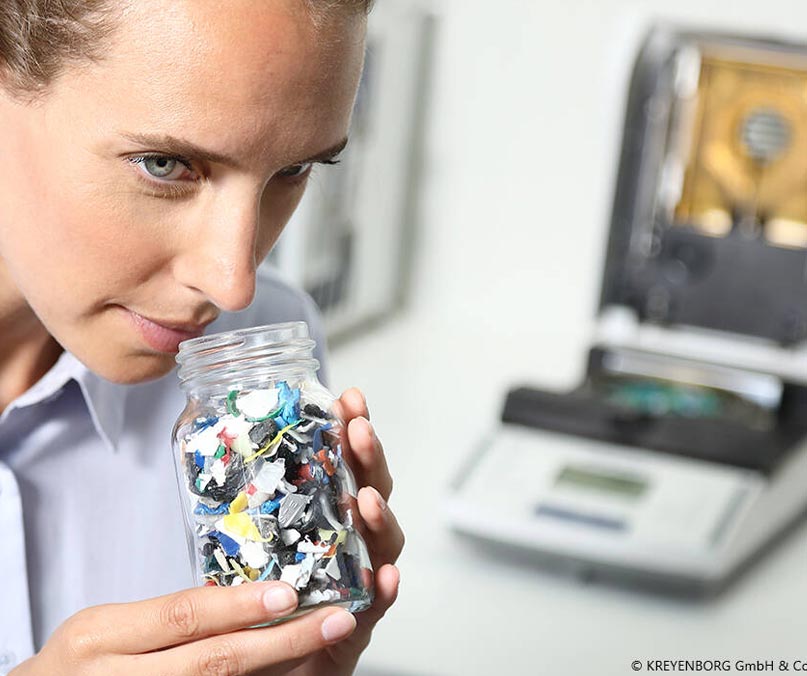Success for Kreyenborg’s IR-Clean Technology: EFSA gives positive “Scientific Opinion” on decontamination of rPET flakes

Process reduces contamination of recycled material to a level determined harmless to health
Senden, July 4, 2025. The Germany-based mechanical engineering company Kreyenborg has achieved a significant success under the new regulation (EU) 2022/1616 of the European Food Safety Authority (EFSA). At the end of May 2025, the authority issued a so-called positive “Scientific Opinion” for its infrared technology “IR-Clean” to the manufacturer, which specializes in processing technology for bulk materials in the plastics and food sectors. This process decontaminates recycled PET flakes which can then be processed again for food packaging that can come into contact with all types of food. With this approval of the process by EFSA, Kreyenborg’s IR-Clean system will be assigned a unique recycling authorization number (RAN) and listed in a public register. According to the machine manufacturer Kreyenborg, several IR-Clean processes have already been individually rated positively by customers in accordance with the old regulation (EC) 282/2008. According to Kreyenborg, the approval procedure would be significantly streamlined and simplified under the new regulation (EU) 2022/1616, both for Kreyenborg itself and for its customers in the packaging industry.
No safety concerns found when adhering to certain process conditions
After evaluating the data from a so-called “challenge test”, the EFSA Panel has concluded that there are no safety concerns for the recycled PET obtained from the IR-Clean process and can therefore be reused for packaging with direct food contact. The boundary conditions for this are: A) Up to 100 % of recycled PET flakes must can.
PRESS RELEASE
Food Plastics Other Bulk Materials
be used for the production of materials and items that come into contact with all types of food and are stored at room temperature or below. B) The starting material shall consist of washed and dried post-consumer PET flakes originating from packaging produced in accordance with Union legislation concerning food contact materials and consisting of no more than 5 % PET from non-food consumer applications. C) The process must run under the same strict process conditions as the “challenge test” for decontamination assessed by EFSA.
Decontamination efficiency through two steps
In the process at Kreyenborg assessed by EFSA, two main steps were evaluated: the decontamination of PET flakes in an infrared dryer (IRD) and the subsequent treatment in a finisher unit. “These two steps were crucial for the efficiency of decontamination at our plant,” says Marcus Vogt, Technical Sales Manager for the plastics sector, summarizing the complex measurements carried out over a long period of time, as part of various challenge tests that preceded EFSA’s assessment. Vogt helped initiate the petition and had been accompanying the approval process for more than six years, which entails various approvals according to US FDA regulations in addition to the EU standards. (Number of characters 2.808 without headline/subline)
Press contact
Kreyenborg GmbH & Co. KG Andrea Camen Marketing/PR
Messingweg 18
48308 Senden
Tel. +49 (0) 2597 93997-187
www.kreyenborg.com
PRESS RELEASE
Food Plastics Other Bulk Materials
Profile/Boiler Plate Kreyenborg
Kreyenborg GmbH & Co. KG is a medium-sized mechanical engineering company in Germany (North Rhine-Westphalia, Münsterland) that specializes in plant engineering for the plastics/chemical and food industries and sells its products worldwide. With around 70 employees, the company produces individual machines and turnkey complete solutions for storing, drying, conveying, dosing, or mixing free-flowing bulk materials. The products are used in the plastics recycling industry as well as by growers, producers, or processors of food. With its innovative and patented infrared technology, Kreyenborg has created a new way to thermally treat bulk materials. Several process steps can be combined in one machine with minimal energy consumption and almost no loss of quality. In the plastics industry, the crystallization and drying of PET has established itself as a standard technology. Kreyenborg infrared dryers are used by food processors for the efficient drying and sterilization of food raw materials such as herbs, spices, seeds, or tea, or for drying and roasting nuts, almonds, pumpkin seeds, which makes further processing or storage possible in the first place. Kreyenborg is a family-owned company that has been producing machines for mixing and conveying technology at its home location in Germany for over 70 years. Silos, tamping units, dosing devices and dryers were added later. The Kreyenborg brand has a name in the plastics industry. Infrared technology opened new sales markets from 2004 onwards. Since 2013, another business area has developed with the food industry. www.kreyenborg.com
Categories
Recent Posts
- Success for Kreyenborg’s IR-Clean Technology: EFSA gives positive “Scientific Opinion” on decontamination of rPET flakes
- KraussMaffei Italiana – The specialists for insulation and white goods
- The Future of Extrusion: KraussMaffei Extrusion TecDays inspire the industry
- KRAUSS MAFFEI FibreForm – Transforming the world’s automotive industry
- The Turtle project: KraussMaffei presents a high-quality sandwich application with recyclate at Fakuma